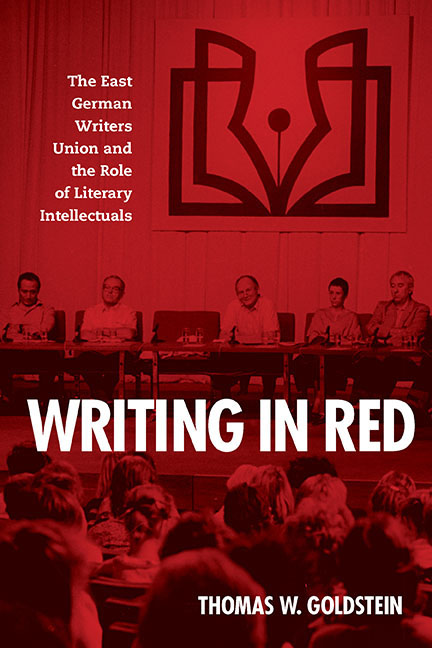Book contents
- Frontmatter
- Contents
- Acknowledgments
- List of Abbreviations
- Introduction
- 1 German Writers Associations through 1970
- 2 Socioeconomic Functions
- 3 The Era of No Taboos? 1971–76
- 4 A Disciplining Instrument, 1976–79
- 5 Defending Peace, Defining Participation, 1979–83
- 6 Years of Resignation, 1983–85
- 7 Glasnost in the GDR? 1985–89
- 8 Coming Full Circle, 1989–90
- Conclusion
- Notes
- Bibliography
- Index
8 - Coming Full Circle, 1989–90
Published online by Cambridge University Press: 24 August 2019
- Frontmatter
- Contents
- Acknowledgments
- List of Abbreviations
- Introduction
- 1 German Writers Associations through 1970
- 2 Socioeconomic Functions
- 3 The Era of No Taboos? 1971–76
- 4 A Disciplining Instrument, 1976–79
- 5 Defending Peace, Defining Participation, 1979–83
- 6 Years of Resignation, 1983–85
- 7 Glasnost in the GDR? 1985–89
- 8 Coming Full Circle, 1989–90
- Conclusion
- Notes
- Bibliography
- Index
Summary
WHEN THE BASE SED organization of the Berlin union met on October 23, 1989, their country was in the throes of revolution. For weeks, thousands had been fleeing the country via a now-open border between Hungary and Austria, and hundreds of thousands joined demonstrations at home. Faced with these pressures, Honecker resigned on October 18, ceding power to more flexible, reform-oriented politicians. Berlin's literary comrades, meeting days after this stunning announcement, issued a set of demands that reflected the liminal situation. First were general reforms for the GDR, including the following: no SED or state functionaries should hold their positions for more than two terms; the nomenklatura system (the privileged class of functionaries) should be ended; privileges and “arrogated special rights” should be eliminated; Neues Deutschland should be independent; a new voting system should be created for state and SED representatives; press, radio, and television should present a “controversial interpretation of societal processes”; opposition groups should be permitted to hold discussions on radio and TV; and the decisions of the Council of Minister's 1989 environmental conference should be implemented. Second were concerns specific to the SV, including an open account of paper allocation to publishing houses.
Noteworthy about this list was first, that it was made public, and second, that it was initiated in opposition to local leaders who called for a more cautious approach. The demands covered a range of topics, from the most far-reaching political reforms to narrower professional concerns. Included were many reforms demanded at the tenth congress, such as honesty in the press, freedom of expression, and environmental protection. Yet these first demands went beyond what had ever been articulated through the SV, especially the insistence on term limits, Party responsiveness to popular pressure, and an end to elite privileges. The demands of these writers, SED members all, had become radicalized over the past month. Swept up in the revolutionary fervor, they inserted their voices into the debates around them, attempting to make good on their special role in a time of crisis. That they would act on this understanding through the SV was a well-established pattern, but openly defying union leaders signaled a new development.
- Type
- Chapter
- Information
- Writing in RedThe East German Writers Union and the Role of Literary Intellectuals, pp. 199 - 216Publisher: Boydell & BrewerPrint publication year: 2017

